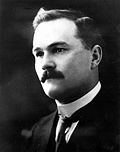
The premier of the Canadian province of Saskatchewan is the province's head of government since 1905. Saskatchewan uses a unicameral Westminster-style parliamentary government, in which the premier is the leader of the party that has the support of a majority in the Legislative Assembly. The premier chooses a cabinet from the elected members to form the Executive Council of Saskatchewan, and presides over that body.
Contents
- List of premiers
- Premiers by party
- Timeline
- List of premiers by time in office
- Notes
- See also
- References
Members are first elected to the legislature during general elections. By constitutional standards, general elections must be conducted every five years from the date of the last election; the province of Saskatchewan has had fixed election dates calling for elections every four years by statutory legislation since 2007, though that has been standard practice since the 1938 election. [1] The premier may also ask the lieutenant governor for early dissolution of the legislative assembly or an early election may be called if the governing party loses the confidence of the legislature, by the defeat of a supply bill or passage of a non-confidence motion.
Prior to 1905, Saskatchewan was part of the North-West Territories and was governed by the lieutenant-governor of the North-West Territories from 1870 until 1897, and the premier of the North-West Territories from 1897 to 1905.

















